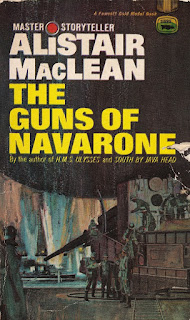During World War II, five men are recruited to achieve the impossible: destroy a German fortress that threatens Allied Naval operations in the Aegean Sea and prevents over 1,200 isolated British soldiers from being rescued. These five men are all experts at various specialties required by the commando operation, including demolitions, engineering, and most provocatively, mountain climbing since access to the fortress is impossible without scaling a sheer cliff face.
Even though the Greek island of Navarone does not actually exist, the story takes place within the real historical context of the “Dodecanese Campaign”, (specifically the Battle of Leros), the Allies' attempt to capture the German-held Greek islands in the Aegean Sea in 1943. Only the second novel by Alistair Maclean, this 1957 World War II novel has been considered a classic of the genre for decades now. These days, of course, stories or movies about a handful of talented men, each with specific specialties, teaming up to pull off a near-impossible task are a dime a dozen but I dare say many of them owe quite a bit to this book. In 1961, a classic film was produced staring Gregory Peck, David Niven and Anthony Quinn, among others.
I’ve read a number of Alistair MacLean books over the years and usually find them OK, but notice they do tend towards the “slow-burn” style, taking quite a while to build to their climax. This one, however, kept me riveted throughout. It’s easy to see why this has become a classic: excellent characters, plenty of edge-of-your-seat suspense, and wonderful pacing. MacLean didn’t believe in much of a wrap-up after the major climax and this one is no exception. The big story payoff was literally on the last page of the book.
I’m very glad I finally got around to reading this one, and now have my sights set on the sequel, [book:Force 10 from Navarone|149608]. I’m also planning to see the Guns of Navarone film this week so as to fill another hole in my WWII film history.

No comments:
Post a Comment